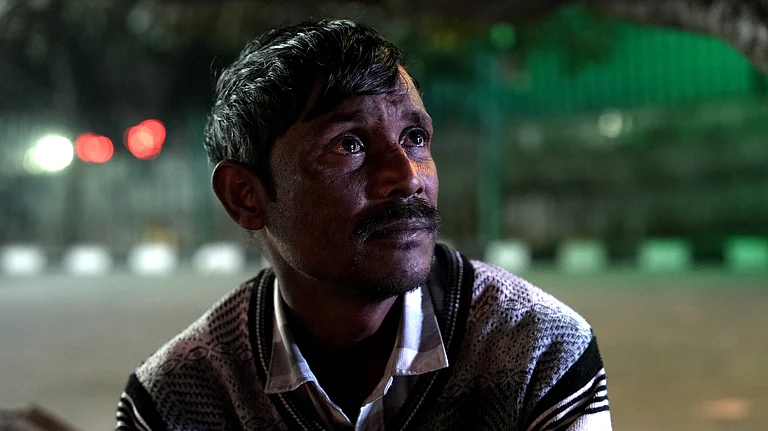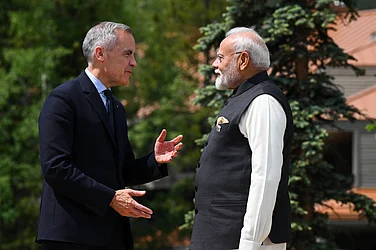Each brick Meena pulls from the wreckage is a piece of her past. For 25 years, these bricks formed the walls of her home in Delhi’s Bhoomiheen camp. Today, she picks them from the dust, loading them onto a truck to sell in the market. The few rupees she will earn are not to rebuild, but to survive. They will be used to feed her two children. It is a heartbreaking transaction: turning the memory of shelter into a meal.
"My ration card was faulty," Meena explains, her voice heavy with exhaustion. "We tried many times to get it fixed, but government work takes so much time and money we just don't have." This faulty ration card prevented Meena from being eligible for a flat, leaving her without the housing promised to slum dwellers.
The Bharatiya Janata Party's "Jaha Jhuggi Waha Makaan" manifesto promised affordable housing to Delhi's slum dwellers, but for many, that promise remains unfulfilled. On June 11, 2025, a dark day for the residents, 300 jhuggis in Govindpuri's Bhoomiheen camp, Southeast Delhi, were razed to the ground. More than 20 days later, the sorrow and scars of losing one's home are still raw.
Construction agencies are now clearing the rubble of cement, metal, and bricks. According to DDA statements, the government demolished approximately 344 jhuggis, displacing at least 1,860 families. Today, large bulldozers arrived to remove the debris—the remnants not just of homes, but of shattered lives, hopes, and shelter.
The excuse of "faulty documents" is a common and painful refrain among those left behind. Chanda Devi, who has lived in the camp for most of her married life, now shelters with her brother under a makeshift cover of wood logs and an old dupatta. "I'm staying with my daughter and relatives, which is embarrassing, but we have nowhere else to go," she says, her eyes filling with tears.
"Some people got homes, but the 'unlucky' ones like us are left to suffer." Her elderly mother, Kunti Devi, adds with deep worry, "My daughter has stopped eating. The sorrow is eating her alive, and I can't bear to see it."
This sentiment is echoed by Pintu, a 24-year resident of Delhi’s now-demolished Bhoomiheen camp, who highlights the hypocrisy: “Our documents were fine during the elections, but now that the government should be paying us back, they are suddenly faulty. The government has broken its promises.”

Despite the visible desperation, Delhi Chief Minister Rekha Gupta recently stated that authorities cannot defy court demolition orders and insisted that displaced residents "have been provided accommodation." This claim rings hollow on the ground, where the vast majority have been abandoned.
The discrepancy raises a critical question: if only a handful of families were rehabilitated, what is the government doing with the hundreds of remaining flats built for this purpose?
The displaced are the city's backbone daily wage earners, labourers, auto-rickshaw drivers, and domestic workers. Deepa Mishra, 45, now lives with her son under a fragile plastic sheet. "They demolished the first six houses on May 30th, then came back on June 11th and destroyed everything," she says, pointing to a heap of bricks that was once her home.
“They didn’t just break our homes; they demolished the Kali Mandir. You see how the statues are lying there? Has the government put itself above God?”

This demolition is not an isolated event. Since the BJP came to power, it is estimated that over 27,000 people have been displaced by such drives across Delhi, with at least 9,000 denied rehabilitation.
The simmering despair is quickly turning to anger. Deepa’s son, Mukesh, had to cancel his own wedding to return and care for his mother. "It is so unsafe here. They gave us no time to gather our belongings," he says, his voice filled with frustration. "I will not let Rekha Gupta win the next election. The Congress gave us these jhuggis, AAP gave us electricity and water, but the BJP has taken everything. We will only vote for those who work for the poor."
The destruction also erased places of cultural and spiritual significance. Sudhir Kumar, a resident of 40 years, sits beside the demolished statue of Gautam Buddha and points to the unrecognizable remains of a Dr. B.R. Ambedkar statue. “They demolished these statues and our temple, completely ignoring our beliefs,” he says firmly. “We are not fighting or revolting; we are talking about our rights. The government has deeply hurt us, and we will never forget this.

In the ruins of Bhoomiheen Camp, the promise of "a house for every slum dweller" has become a cruel joke. The official line points to court orders and faulty paperwork, but for the families sleeping under open skies, these are just excuses that mask a profound failure of governance and empathy.
Their shattered homes are a stark symbol of a broken social contract, leaving hundreds of Delhi's working poor to navigate a future of uncertainty and fueling a quiet but growing anger that may echo far beyond the rubble.



























